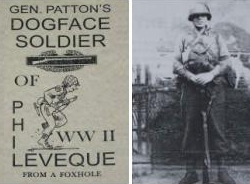
Publisher:
Bonnie King
CONTACT:
Newsroom@Salem-news.com
Advertising:
Adsales@Salem-news.com

~Truth~
~Justice~
~Peace~
TJP
Sep-24-2007 11:32

 TweetFollow @OregonNews
TweetFollow @OregonNews
PTSD and the Pizzen Factor
Dr. Phillip Leveque Salem-News.comPhillip Leveque has spent his life as a Combat Infantryman, Physician, Toxicologist and Pharmacologist.
 The Four Doctors by John Singer Sargent, 1905, depicts the four physicians who founded Johns Hopkins Hospital. The original hangs in the William H. Welch Medical Library of Johns Hopkins University. From left to right: William Henry Welch, William Stewart Halsted, William Osler, Howard Kelly |
(MOLALLA, Ore.) - Many years ago I was searching my genealogy when I discovered in the British Medical Journal an article about an ancestor, a Doctor Fenwick, who practiced in the northern counties of England next to Scotland in the late 1700's.
In the journal was another brief story about a Doctor Geoffry Pizzen, who was either a Sir or an Esquire. I think they are about the same.
The brief story was very interesting to me because it basically was about whether the name was pronounced Jeff or Geeoff. He said he didn't care and this was known by himself and his friends as the Pizzen Factor.
Pizzen apparently was a physician/scientist and was well educated in both. One of his most notable writings was that there were two sides of every question or factor with persons on each side with strong opinions about which was correct. His friends also named this the Pizzen Factor.
This statement apparently got wide circulation in Britain and Europe. In France, it came out like mal de poisson (literally almost bad fish or disagreement and it even got to Denmark where it was re-translated "something fishy in Denmark" which is even used in America.
Apparently, Sir William Osler, said to be the "Father of American Medicine," brought the Pizzen Factor concept to America, possibly at Johns Hopkins Medical School where he was supposed to have said at a discussion of two or more doctors about a patient's disease, "If there is any question, ask the patient, he will tell you what's wrong, what helps and what makes it worse." This is supposed to be the patient's own history.
As a former professor of pharmacology, I was dubious about all of the diseases which the state of California said were helped by cannabis/marijuana.
After interviewing several thousand patients about the relief they obtained from cannabis/marijuana, I am rarely surprised when a patient with a new condition and tells me marijuana helps. This goes especially for psychological or psychiatric conditions such as PTSD. If the medicine helps, it must be true. I will defer to the patient rather than to one or more doctors who adhere to the Pizzen Factor too strongly for their own opinions.
The Pizzen Factor has been vulgarized in America and sometimes called a Pizzen contest.
******************************************************* You can email your questions to the doctor: newsroom@salem-news.com
You can email your questions to the doctor: newsroom@salem-news.com
 More information on the history of Leveque can be found in his book, General Patton's Dogface Soldier of Phil Leveque about his experiences in WWII. Order the book by mail by following this link: salem-news.com/pages/Dogface_soldier.
More information on the history of Leveque can be found in his book, General Patton's Dogface Soldier of Phil Leveque about his experiences in WWII. Order the book by mail by following this link: salem-news.com/pages/Dogface_soldier.
If you are a World War Two history fan, you don't want to miss it.
Watch for Dr. Phil Leveque's video question and answer segments about medical marijuana with Bonnie King.
Other articles and video segments about medical marijuana on Salem-News.com:
- Oregon Medical Marijuana Doctor Tells All: Q&A Part 6 (VIDEO)
- Medical Marijuana: Treatment for Marijuana Dependence
- Medical Marijuana Medical Conditions
- Medical Marijuana Medical ConditionsConnecticut Governor Vetoes Medical Marijuana Bill
- Medical Marijuana: PTSD Medical Malpractice
- Marine Combat Vet Discusses Iraq, PTSD and Medical Marijuana
- The Most Dangerous Man in Oregon
- Medical Marijuana: What it's About
- Oregon Medical Marijuana Doctor Discusses PTSD Treatment (VIDEO)
- PTSD: Life-Long Challenge For Growing Number of Veterans
- Medical Marijuana: A California Success Story
- Oregon Medical Marijuana Doctor Tells All: Q&A Part 3 (VIDEO)
- Medical Marijuana: The Replacement for Very Dangerous Drugs
- Oregon Toxicologist Says Treatment for PTSD Should Include Cannabis
- Medical Marijuana Doctor Responds to Written Comments (VIDEO) (Originally titled Oregon Medical Marijuana Doctor Tells All: Q&A Part 3)
- Oregon Medical Marijuana Doctor Answers All (VIDEO)
Articles for September 23, 2007 | Articles for September 24, 2007 | Articles for September 25, 2007

Salem-News.com:


googlec507860f6901db00.html
Quick Links
DINING
Willamette UniversityGoudy Commons Cafe
Dine on the Queen
Willamette Queen Sternwheeler
MUST SEE SALEM
Oregon Capitol ToursCapitol History Gateway
Willamette River Ride
Willamette Queen Sternwheeler
Historic Home Tours:
Deepwood Museum
The Bush House
Gaiety Hollow Garden
AUCTIONS - APPRAISALS
Auction Masters & AppraisalsCONSTRUCTION SERVICES
Roofing and ContractingSheridan, Ore.
ONLINE SHOPPING
Special Occasion DressesAdvertise with Salem-News
Contact:AdSales@Salem-News.com
Terms of Service | Privacy Policy
All comments and messages are approved by people and self promotional links or unacceptable comments are denied.
S.LaMarche; September 24, 2007 8:50 pm (Pacific time)
Yeah, it works for me really well. Legalize It!!
[Return to Top]©2026 Salem-News.com. All opinions expressed in this article are those of the author and do not necessarily reflect those of Salem-News.com.